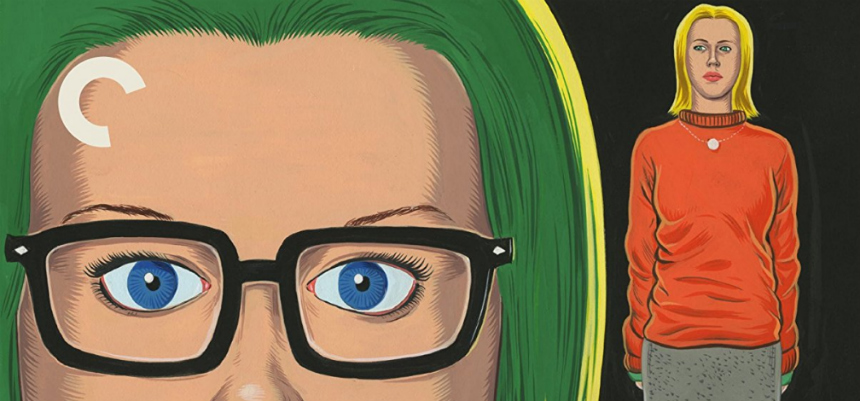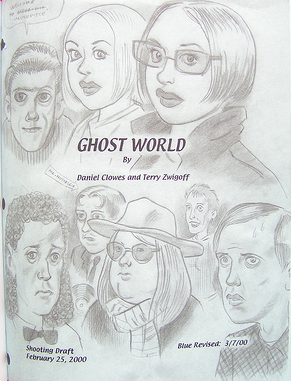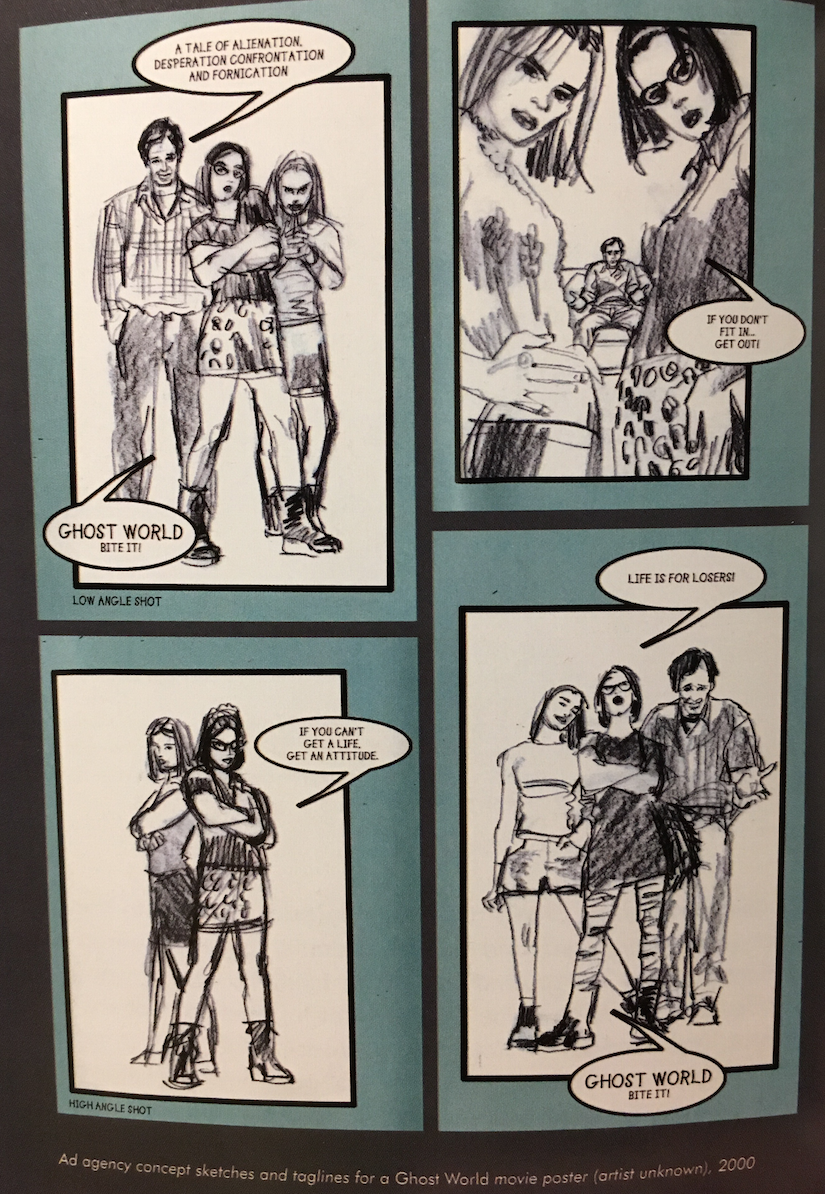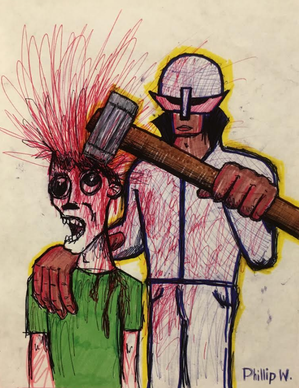Blu-ray Review: Criterion Explores Clowes and Zwigoff's GHOST WORLD

It’s often difficult to review Criterion releases, because it tends to involve putting into words your feelings about your ‘favorite movie’.
This term, when spoken by me, doesn’t hold much weight among my friends, more so, groans and eye rolls at the notion that has long since gone without saying that I have a hundred favourite movies that I could maybe whittle down to a tight 50. I admit to using the term somewhat loosely, yet am undyingly sincere in the notion that there exists a genre of crème de la crème films that I don’t mind blanketing in a ‘favorite movie’ genre: Criterion’s specialty.
In the words of Mark Frost, “Good literature is a mirror through which we see ourselves more clearly”, and for many, Ghost World taps into that urge to watch the shit out of your favourite movie, thereby spending as much time with its protagonists as possible.
The same can be said for a film like Dazed and Confused, or films with similarly youthful energies, like in the fast time of John Hughes’ 80s, but what makes Ghost World stand so far above any “teenage film” before it is... the very intangibility I’m currently tasked with putting into words. Luckily, these always-impeccable Criterion releases offers that very challenge and the rare opportunity to review a work in full with the assumption that the reader, too, has seen, and in many cases, celebrated the favorite movie of the month. If you have yet to see Ghost World, I am jealous of you. Off you go.
 Let’s start with the fact that Ghost World is the ultimate 90s take on so-called “teen angst”. Yes, the film came out in those early, confused millennial years - and it is interesting to consider it in these terms - but co-screenwriter, Daniel Clowes, had been publishing chapters of his Ghost World series in his comic anthology 'Eightball' since ‘93 and, at one point, Enid even tells a psychic that her birthday is December 23rd, 1979.
Let’s start with the fact that Ghost World is the ultimate 90s take on so-called “teen angst”. Yes, the film came out in those early, confused millennial years - and it is interesting to consider it in these terms - but co-screenwriter, Daniel Clowes, had been publishing chapters of his Ghost World series in his comic anthology 'Eightball' since ‘93 and, at one point, Enid even tells a psychic that her birthday is December 23rd, 1979.
More to the point, Clowes and director, Terry Zwigoff began collaborating on the Ghost World screenplay at least as early as 1997, while Clowes was still finishing his run of 'Ghost World' issues, trying hard not to confuse his characters with the newly evolving characters of the film. At the very least, the film’s sarcastic attitude is spiritually 90s, but let’s say with a touch of retrospective distance. Grunge is over and all that’s left emanating from the 50s diner jukebox is barely-bygone commercial Hip Hop (they couldn’t afford Britney Spears).
Unlike 94s Dazed, where Linklater almost sideswipes the teen angst theme entirely, favouring instead the pure unadulterated world of free and easy good times -aside from some everyday good ol’ boredom, and very unlike how Fast Times director, Amy Heckerling brought us the ultimate satirically privileged 90s world of Clueless in ‘95, Gost World’s celebration of cynicism far transcends the Reality Bites analysis of authenticity à la Douglas Coupland's “Generation X”.
And how does Ghost World rise above the beloved coming of age genre that by 2001 had already been played out in endless iterations? For starters, its protagonists, Enid and Rebecca - immortalized by Thora Birch and a 15 year old Scarlett Johansson (in her best film) - hate all the movies I’ve thus far mentioned. For Enid, it may go even deeper. If she had the opportunity, she just might hate Ghost World too, but that’s another story.
There are very few things left to appreciate in the wasteland of modern society that Enid and Rebecca cohabitate, joined at the hip by their mutual distrust and loathing of most people and things - certainly those spoonfed to them by mainstream culture. They prefer the authenticity of the loser- and not the Ally Sheedy loser in the high school outsider sense.
Enid and Becky appreciate peripheral losers, like the local satanists, or the jerry curl waiter at Wowsville, or the corporate punk, or the old man who seems to be spending the rest of his life waiting for a bus that isn’t coming; they want characters. Repulsed by a world assaulting them from all angles, whether through the unwanted top-40 sounds of “we’re gonna have fun fun fun, in the sun sun sun” (a but of feax-pop Zwigoff shares with Todd Solondz), or the cloying everything about high school, or the sad reality of family, the strength of Rebecca and Enid lies in their ability to laugh at outrageous mundanity and sift through noise to find worldly things of genuine interest.
Enid seeks out videotapes that offer glimpses of the hidden cool. Where the film could start at the story’s actual beginning, Enid and Rebecca’s high school graduation, and any other teen film of this ilk probably would, Ghost World removes the emphasis and significance of their graduation and places it on the night prior; a voyeuristic glimpse of Enid ironically wearing her grad sash while rocking out to a Bollywood surf-psych jam called Jan Pehechaan Ho, taken from the 1965 Indian film, Gumnaam.
As a mysterious commentator says in the special features, these characters are “media savvy explorers of the unknown and exotic”. And they have very little to do with the classmates with whom they’ll soon be graduating into new life phases alongside.
The ceremony itself is a rich joke deserving of the proverbial ‘finger’ and, within five minutes of the film, Enid and Rebecca’s are set loose into the world… almost. Enid is held back for failing art class and must attend summer school under the desperate tutelage of an over-the-hill performance artist named Roberta Allsworth: an incredibly funny character perfected by Illeana Douglas, who cuts Ms. Allsworth in the cloth of Laurie Anderson.
In this mini fusion with Art School Confidential, Clowes and Zwigoff’s next collaboration, Ghost World achieves some of its richest laughs. Here, more than anywhere else in the film, it’s easy to see Enid as a young Dan Clowes, failing to function within a system that, rather than praise originality, rewards pretension and patronizes his/her sketchbook as “amusing”.
Enid’s appreciation of societal geeks, combined with her loathing of the emptiness and idiocy that pulsates boring stripmall America, comes to a head when she meets the pathetically charming Seymour, played with a sympathetic sweetness unique to Steve Buscemi. While originally only of interest to the girls for the purposes of objectifying, not unlike the two girls who stalk and pester Peter Sellers in The World of Henry Orient (as Clowes shouts out in the commentary), Seymour reveals himself to be the least conformist thing about their town.
He effortlessly cuts against the grain of everything that is the modern norm by rejecting it, instead dedicating his life to ancient relics of authentic expression - a world of ghosts replaced by a garishly disposable culture of gibberish. It’s almost as if their budding relationship is a meeting of the minds of Clowes’ and Zwigoff’s aliases: the female teenage Clowes meets the lonely, jaded, obsessive blues historian; a man who has whittled his collection down to a tightly imperative 1500 78s - just ‘the favourites’. What is age among kindred spirits?
Repressing the Lolita subtext of their random-seeming connection, the two spark a beautiful friendship, romantic in its disdain for romance. Seymour, content in his failures, is hopeless and indifferent to the ways of love, making him all the more heroic as a character to Enid.
When she attempts to play matchmaker during one of Seymour’s rare outings to see a legend of ragtime-guitar open up for a studly pub band of morons playing generic 12-bar - singing “I was down in the delta, picking cotton all day long” - Enid takes a look around at all the jerks at the bar, evoking the opening credits that peer into the windows of all the jerks in the neighbourhood, reminding us of all the Maloras from school, and the Blockbuster clerks, and the movie theater managers, and all the profound drags she must endure on a daily basis, and then she lands back on Seymour, who she doesn’t remotely hate. He is the only outsider to whom she identifies.
In fact, Seymour may be a kind of mirror. There is, however, a key distinction between the two of them and Enid will have to discover it the messy way. For one, her adult doppelganger hates himself and will shift his passions at the drop of a hat at the off chance of companionship. For the promise of happiness, Seymour is willing to wear an amicable, subtly aghast smile when his date questions the worth of Laurel & Hardy. “Why does the fat one have to be so mean to the skinny one?”
That, and far more essentially, despite the wisdom beyond her years, Enid is still a kid and one who, at her own yard sale, can't bring herself to part with a doll named Goofy Gus and other relics of her formative years. She has flirted with the darkness of a sardonically esoteric outlook, but her glimpse at the realities of an adult life she can envision proves realer than she can stand.
If this prophecy weren’t existentially perplexing enough, without school to bind their hate-based relationship together, Enid and Rebecca begin gradually splintering off into separate directions; one of the biggest tragedies growing up has to offer. Our lives develop in increasingly specific ways that loosen the links that bind us with our childhood friends. For Enid, even sadder than the hints at her inevitable falling out with Rebecca and all the tragic vanishing nostalgia that comes with growing out of your past, is the hint that alienation of this kind may speak to a larger loneliness of residing in the world at large.
Is the mysterious ‘Ghost World’, of which the title speaks, one of the living past? Is Enid an adult lucidly walking through the bygone days of her ending innocence? Is she mourning the ghosts of her own past lives? Are the ghosts those of the ancient blues musicians, crying for what's become of the culture of truth they’ve offered America? Are they the ghosts of the great comedy, long after the joke has expired and all that remains is the underlying sadness? Does 'Ghost World' mean any one specific thing at all or is it only meant to evoke a feeling, like the one Zwigoff so softly and subtly intones throughout the film.
It’s a loose narrative that, before you realize it, begins to feel like a countdown to something, but what? Is it a downward spiral? Is it a coming of age? Or is it just another boring day in a disposable landscape of an ephemeral life?
The teenage angst of Ghost World ends up being so painstakingly real it graduates into adult angst before our eyes in the most deeply existential sense. Like its enigmatic title, Ghost World’s ending can mean everything or nothing or both. It’s yearning to escape could be an expression of confused self-loathing; a great person wishing they were a wholly different person: one who’s intellectually devoid of the capacity for deeper thought and unconcerned with ideas typically accompanied by heavy sadness.
Maybe Enid is running away, not only from Rebecca, but anyone or thing that will remind her of herself and her roots. The adult world of Ghost World’s gaze, on days when humour can’t rescue it, holds nothing for Enid to look forward to. Perhaps it’s a childish bit of Peter Pan outlashing; an activistic aversion to aging informed by a real awareness of the horrors of the American epilogue.
If her disappearance into the night riding on the ghost bus is literal, Enid's journey away from her childhood 33s - the one with the lyrics, “I'll be noticed because I'll wear a smile and a ribbon in my hair“ - will lead to more stylistic reinventions in more naive efforts to run away from herself. If climbing on the ghost bus - which may or may not be in service - is figurative, perhaps Enid’s escape amounts to a disappearance into esoteric solipsism; a terminal personality, which few outsiders will successfully penetrate.
Maybe one’s takeaway will say more about the viewer than Enid. In any case, is there anything more cinematically exciting than a film as simultaneously bitter, heartfelt, moving, sympathetic, and most of all, funny in its approach to empty reality as Ghost World? I can say for certain, the void has never been so funny and terrifying.
The future for Enid and Rebecca is anyone’s guess, but in 2008, Clowes did pen some quick hypothetical outcomes for Ghost World’s hardcover special edition. In one reality, Enid is married and seemingly happy while Rebecca’s gloomy disposition has landed her with a chronic depression that compels her to send Enid desperate, unwelcome emails from time to time.
In another reality, Rebecca is the accomplished writer and, one day, Enid hungrily approaches her at a signing and awkwardness ensues. In the commentary, Zwigoff muses that Enid probably now writes for blogs about Dario Argento and Rebecca has a kid. One day over Facebook, they probably connect and briefly marvel about how different their lives are. Surely the angst remains, but it has a new face in a new world.

Criterion Supplements
Booklet
The package begins with a beautiful little booklet including an excellent essay by critic, Howard Hampton, a 2001 piece by Zwigoff on the film’s soundtrack, and reprinted Ghost World excerpts from Clowes’s comic anthology series, Eightball. Hampton’s impressive essay offers beautifully articulated gems like “Honouring Daniel Clowes’s poker-faced, weird out comic book while folding Zwigoff's own neurotic baggage into the mix, Ghost World made desperation not only morbidly funny, but also cheekily enigmatic, moving, and sort of heroic, in a Sisyphus-goes-to-the-convenient-store way.”, and Zwigoff’s soundtrack introduction is pure gold.
Zwigoff provides some context for the film’s sound, while offering simultaneous windows into his obsessive appreciation of roots music and disdain for disposable consumerist entertainment. This is also where you’ll find incredibly worded gripes like Zwigoff’s old one against Cream, who had a hit with Skip James’ I’m So Glad in the late 60s. At the time, Zwigoff was indignantly mortified to have to listen to Cream’s inferior cheapening of one of his masters’ greats and it's utterly hilarious to consider Cream as the original Blueshammer.
The booklet also features a plethora of miscellaneous images, production relics, and art pieces, like Phillip’s The Mutilator drawing, or, my favourite, an advertising firm's cringingly wrong-headed proposal for the Ghost World marketing campaign.

Audio commentary featuring Daniel Clowes, Terry Zwigoff, and producer, Lianne Halfon
This is the package’s prize pig, so to speak; a hysterical commentary track that, in addition to telling you everything you need to know about the film and its production, even more valuably offers priceless banter from Clowes and Zwigoff that so clearly informs and evokes their collaborative voice, while also distinguishing which elements come from whose personality. I’ll offer one great insight from Daniel Clowes and let you discover the remaining nuggets for yourself.
“I tried to imagine myself as friends with Enid, if I was a girl, that was how I got into writing the character. Because all my life I've had friends who are male versions of Enid or girlfriends that were exact versions of Enid - the dominant, the one who sucks up all the air in the room, and I was always the quiet one who's processing things differently. So I was much more writing it through Rebecca's eyes in that way. In the film, it's much more through Enid. She comes alive more. And in the film you're seeing through her eyes."
To share one more highlighting: producer Lianne Halfon breaks during the scene where Enid is listening to her childhood records. It’s a moment that always chokes me up as well, so I was right there with her. Golden followup: Halfon mentioning that Patience and Prudence were in their 40s when she reached out to them for licensing,
New interviews with actors Thora Birch, Scarlett Johansson, and Illeana Douglas
What’s not to like about three great actresses with very interesting biographical narratives of their own, sharing thoughts on a film they so clearly adore. It’s obviously interesting to hear Scarlett’s perspective, not just because she’d grow to be the most famous of the lot, but because she was only 15 at the time of production, acting in an extremely rich film that has already stood the test of time.
Thora Birch was something of a deserving childhood celebrity at the time, having been in respectable family films from Now and Then to the far more sophisticated Alan Ball romp, American Beauty, in which she appeared partially nude at only 16 years old (how was that okay?). Then there’s the wonderful, Illeana Douglas, who fills in the gaps of what audiences already know: of course she took liberties with Ms. Allsworth, and I’m not remotely surprised by how much her contributions added to the comedy of every moment she touched.
 I still laugh out loud when I think of Douglas looking at her student, Phillip’s drawing, The Mutilator. When Philip explains it was inspired by a video game, Ms. Allsworth responds “Oh, I thought maybe it was your father.”
I still laugh out loud when I think of Douglas looking at her student, Phillip’s drawing, The Mutilator. When Philip explains it was inspired by a video game, Ms. Allsworth responds “Oh, I thought maybe it was your father.”
Regardless of whether that was a scripted line or one of Douglas’s brilliant improvizations, she came up with material easily as funny and put accross the character like no one else could have. Anything she wants to say about Ghost World, which Douglas says she still gets stopped about, I want to hear.... Especially anecdotes like the one she tells about a mishap on the set of New York Stories, which she was in alongside a young Buscemi.
As with many special editions containing multiple interviews or commentary tracks, some of the same anecdotes are bound to come up, but it’s always fun, as in the case of Ghost World’s supplements, to hear varied accounts of the same memories.
Perhaps my favourite comes from hearing Zwigoff address something in the commentary that, I think, ScarJo shares in her interview regarding Buscemi being put off by the amount of attention paid to the extras. It seemed to many that the ordinarily bizarre background characters were more important to the Ghost World than the principals.
Extended ‘Jan Pehechaan Ho’ excerpt from Bollywood film, Gumnaam (1965) with commentary
Clocking in at almost six minutes, the 'Jan Pehechaan Ho' scene from Gumnaam is hypnotizing in its choreography and generally wild style, not to mention its rockin’ croons. Along with the immensely watchable scene, one that stands up to any American musical sequence that I can think of, Criterion offers a mysteriously unlabeled commentary track by an Indian woman who clearly knows her stuff, despite her hidden relationship to the film. Whatever qualifies her for the job, she’s pleased as punch that Gumnaam has gotten, and continues to get, its belated due thanks to Ghost World.
The specialist also alludes to a fact reiterated in the main commentary, which is that Clowes was unsurprisingly a unique VHS collector. In an age before YouTube, underground cassettes were a coveted source of worldly exposure and when Zwigoff casually caught a glimpse of one of Clowes’s greatest hits while on a lunch break from screenwriting, he knew immediately that Jan Pehechaan Ho was to feature prominently in the film. Clowes was like, “sure.”
Deleted Scenes
The collection offers nine tickling minutes of deleted scenes, which will surely keep fans smiling throughout. Mostly, it’s things like extended convenience store scenes, milking the mullet man so often ripped-off in the decade to come for all he’s delightfully worth - his ongoing battles with the loose lipped convenience store clerk is a rivalry worthy of Laurel & Hardy!
We also get more Ms. Allsworth, more of the pseudo-Starbucks trivia man and more ‘Weird’ Al the waiter. Most significant as far as the story is concerned, is a scene where Enid, in a fit of reckless confusion, seduces the lifeless Josh, played by the underrated Brad Renfro, only to feel more lost than ever in the wake. Like the best deleted scenes, it’s one better left on the cutting room floor, but damn fascinating to watch.
Trailer
Here you go!
In summation, buy this package. Buy it right now. And feel free to put your own love for Ghost World into words below.








